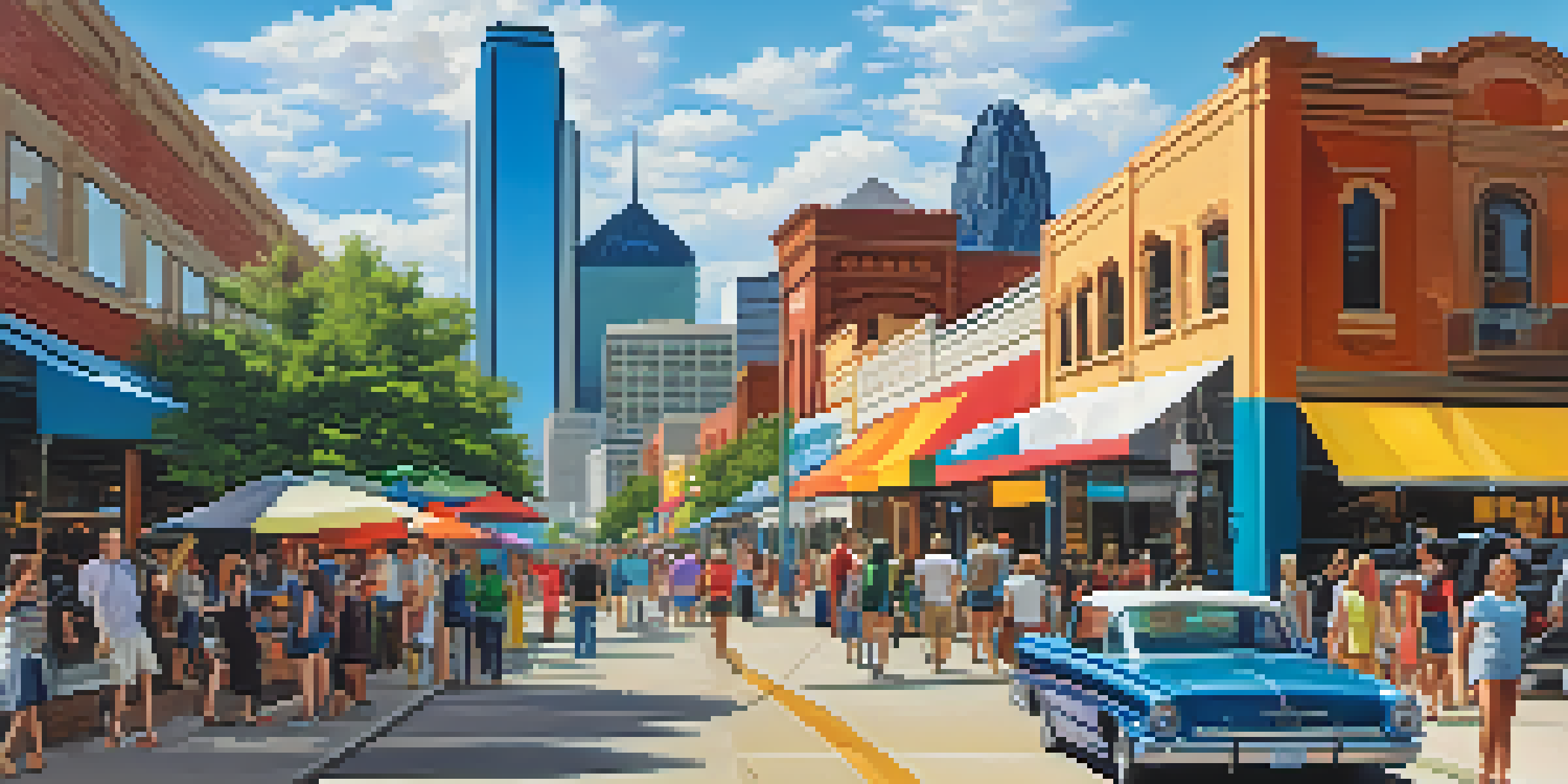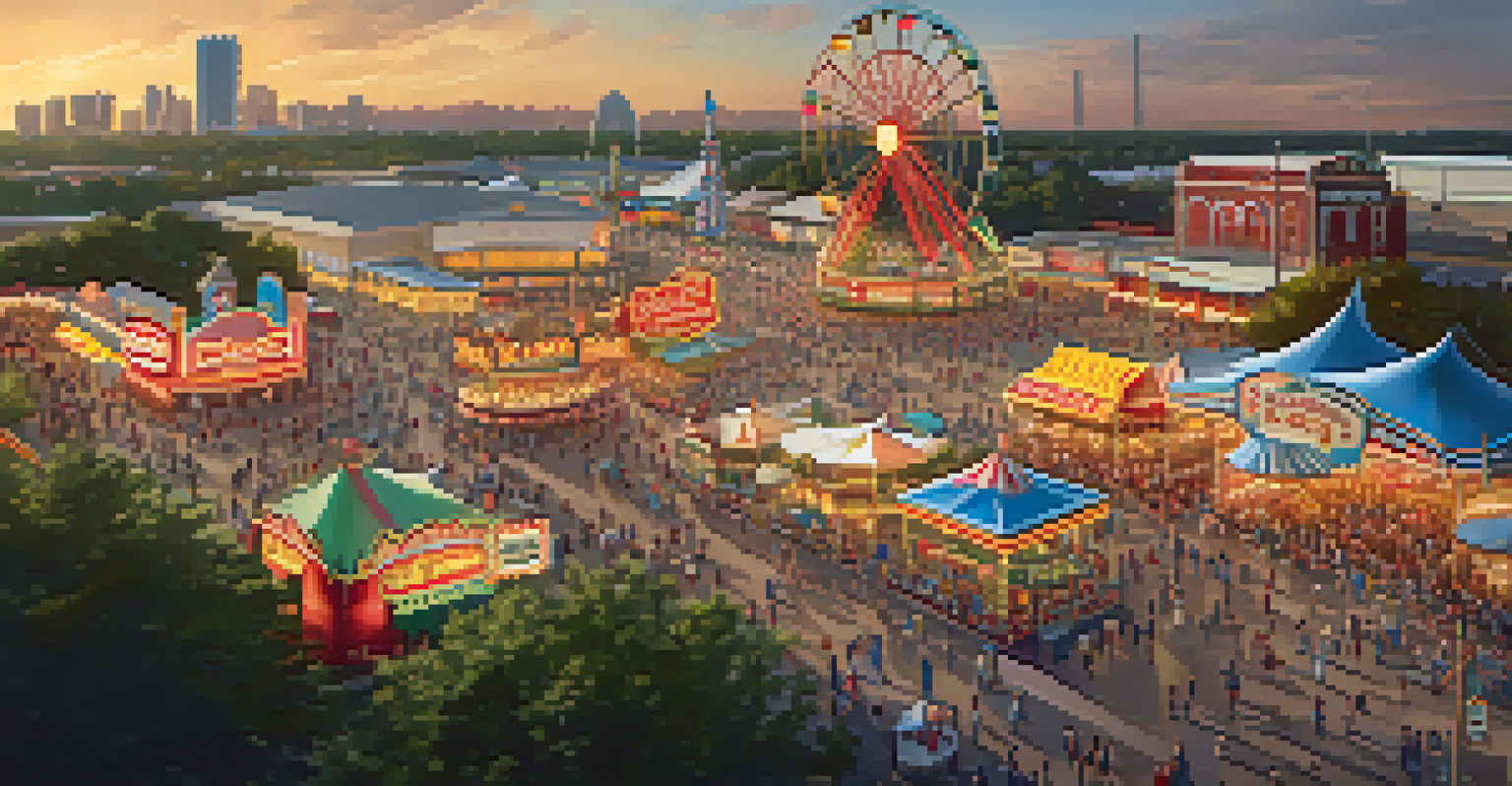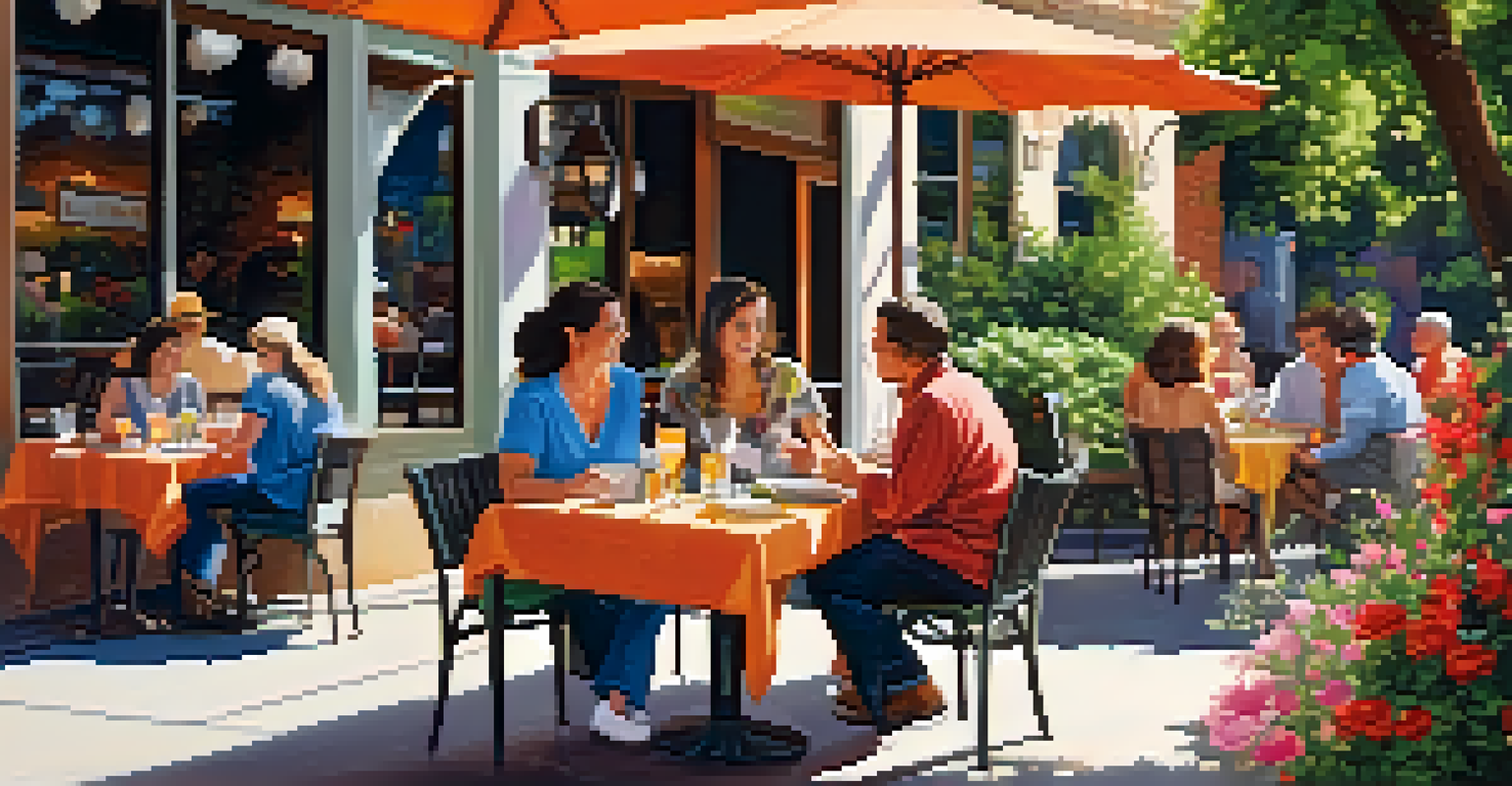The Influence of Tourism on Dallas's Economic Landscape

Tourism as a Key Economic Driver in Dallas
Tourism plays a pivotal role in driving Dallas's economy, contributing significantly to job creation and local spending. With attractions like the Dallas Arts District and the historic Dealey Plaza, the city draws millions of visitors each year. This influx of tourists not only supports hospitality and retail sectors but also stimulates growth in related industries, such as transportation and entertainment. Essentially, tourism acts as a catalyst for economic development, creating a ripple effect that benefits various sectors.
Tourism is a major economic engine that fuels job creation and community development.
The economic impact of tourism extends beyond immediate spending; it also fosters long-term growth. Local businesses thrive as they cater to the needs of tourists, from restaurants to souvenir shops. Moreover, the revenue generated from tourism often leads to reinvestment in community projects, enhancing the quality of life for residents. This symbiotic relationship showcases how tourism can uplift both the economy and the community.
In recent years, Dallas has seen a concerted effort to promote its tourism offerings, further boosting economic activity. Initiatives to host major events, such as sports championships and cultural festivals, have put the city on the map as a premier travel destination. As we look to the future, continuing to harness tourism's potential will be crucial for sustaining Dallas's economic momentum.
Job Creation Through the Tourism Sector
One of the most significant benefits of tourism in Dallas is job creation. The hospitality industry alone employs thousands of locals, providing opportunities in hotels, restaurants, and entertainment venues. These jobs not only support families but also help to stimulate the local economy, as employees spend their earnings in the community. From entry-level positions to management roles, tourism offers a diverse range of employment opportunities.

Additionally, many of the jobs created in the tourism sector are part-time or seasonal, providing flexibility for students, retirees, and those looking to supplement their income. This accessibility makes tourism a vital component of the job market in Dallas. As tourism continues to grow, it creates a more robust labor market, enabling a broader workforce to engage in economic activities.
Tourism Drives Dallas's Economy
Tourism significantly boosts job creation and local spending, benefiting various sectors in Dallas.
Moreover, tourism-related jobs often come with opportunities for career advancement. Many workers start in entry-level positions and, with experience and training, move up the ladder to management or specialized roles. This upward mobility not only benefits individuals but also contributes to a more skilled workforce in Dallas.
The Impact of Major Events on Local Economy
Dallas hosts a variety of major events throughout the year, significantly impacting its local economy. Events like the State Fair of Texas and the Dallas International Film Festival attract thousands of visitors, creating a surge in demand for accommodations, dining, and entertainment. This influx of tourists leads to increased revenue for local businesses, helping them thrive in a competitive market. Major events also enhance the city’s visibility, drawing attention from potential future visitors.
Cities that invest in tourism not only attract visitors but also create opportunities for their residents.
In addition to direct spending, these events create numerous temporary jobs, further boosting the local economy. Event organizers often hire local vendors, caterers, and staff, providing a temporary economic uplift to the community. The positive economic effects are often felt long after the events conclude, as satisfied visitors may choose to return or recommend Dallas to others.
Moreover, hosting major events positions Dallas as a cultural hub, enhancing its reputation and attractiveness as a travel destination. This reputation can lead to more events in the future, creating a sustainable cycle of tourism and economic growth. Ultimately, the impact of these events extends beyond immediate financial benefits, fostering long-term community engagement and pride.
Tourism's Role in Urban Development
Tourism has a profound influence on urban development in Dallas. As the city attracts more visitors, there is a growing demand for infrastructure improvements, including transportation, public spaces, and accommodations. This demand often leads to investments in urban renewal projects that enhance the overall quality of life for residents. For instance, the revitalization of the Trinity River area has turned it into a popular destination for both tourists and locals.
Additionally, the development of hotels and attractions can lead to increased property values in the surrounding areas. As neighborhoods become more desirable due to their proximity to popular tourist spots, local businesses also benefit from the increased foot traffic. This development creates a win-win situation where tourism fuels growth while simultaneously improving urban living conditions.
Major Events Boost Local Revenue
Hosting events like the State Fair and film festivals attracts visitors and generates increased revenue for local businesses.
Furthermore, urban development driven by tourism often emphasizes sustainability and community engagement. Many new projects incorporate eco-friendly designs and promote local culture, ensuring that growth aligns with the city's values. By investing in tourism-focused urban development, Dallas not only enhances its appeal but also creates a more vibrant community for all.
Cultural Exchange and Community Impact
Tourism fosters cultural exchange, enriching the community by bringing diverse perspectives and experiences to Dallas. Visitors from different backgrounds share their traditions, cuisine, and customs, creating a melting pot of cultures that enhances the local atmosphere. This cultural interplay not only benefits tourists but also offers residents the opportunity to learn and grow from each other’s experiences. Festivals, art exhibitions, and culinary events often highlight this vibrant tapestry.
Moreover, tourism encourages local communities to celebrate and preserve their heritage. As visitors seek authentic experiences, local cultures become more visible and appreciated. This recognition can lead to increased funding for cultural initiatives, helping to sustain and promote local traditions. In this way, tourism acts as a guardian of cultural identity, ensuring that unique stories and customs are shared with the world.
The community impact of tourism extends beyond culture; it also promotes social cohesion. Events that bring people together, whether locals or visitors, can strengthen community bonds. By participating in shared experiences, residents develop a sense of pride in their city, fostering a welcoming environment for all.
The Economic Ripple Effect of Tourism Spending
The economic ripple effect of tourism spending in Dallas is significant and far-reaching. When tourists visit, they spend money on hotels, dining, shopping, and entertainment, creating revenue that flows through various sectors of the economy. This spending supports local businesses, leading to job creation and even more economic activity. Essentially, every dollar spent by a tourist helps to generate additional income for the community.
Moreover, tourism spending contributes to local tax revenues, which can be reinvested into public services and infrastructure. This boost in tax income can lead to improvements in schools, parks, and transportation systems, benefiting both residents and visitors. As Dallas continues to attract tourists, the resulting tax revenue can be pivotal for funding essential community projects.
Cultural Exchange Enriches Community
Tourism fosters cultural exchange, allowing residents and visitors to share diverse traditions and experiences.
This ripple effect also extends to ancillary services, such as transportation and maintenance. For instance, increased tourist traffic can lead to enhanced public transit options, which serve both visitors and locals. By recognizing the interconnected nature of tourism spending, Dallas can harness this potential to create a more vibrant and economically stable environment.
Future Trends in Dallas Tourism and Economy
Looking ahead, the future of tourism in Dallas is poised for exciting developments that will further shape the local economy. As the travel landscape evolves, Dallas is adapting by embracing sustainability and innovation. Eco-friendly practices are becoming more prevalent, with many businesses aiming to minimize their environmental impact while attracting conscious travelers. This shift not only appeals to tourists but also strengthens the community's commitment to sustainability.
Additionally, advancements in technology are set to revolutionize the tourism experience in Dallas. From virtual tours to enhanced booking systems, technology is making travel more accessible and personalized. This tech-driven approach can enhance visitor satisfaction, encouraging repeat visits and positive word-of-mouth. As Dallas becomes a tech-savvy destination, it positions itself for continued economic growth.

Finally, as Dallas seeks to diversify its tourism offerings, there is a growing emphasis on niche markets, such as culinary tourism and sports tourism. By catering to specific interests, the city can attract a broader range of visitors, creating new economic opportunities. This strategic focus on diverse tourism avenues will be essential for Dallas to thrive in an ever-competitive travel market.